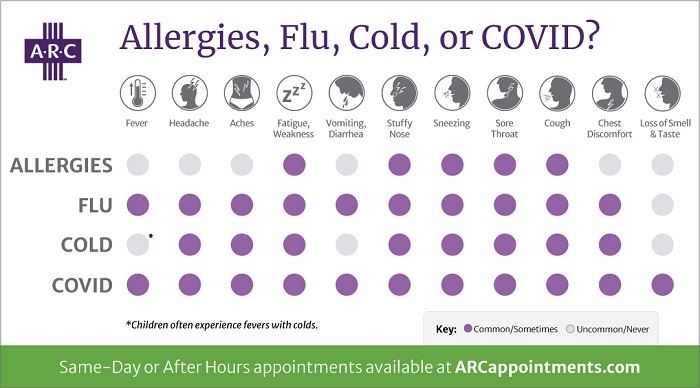As Austin prepares for the upcoming allergy season, we find ourselves simultaneously navigating flu season and the persistent presence of COVID-19. With overlapping symptoms such as a stuffy nose, sore throat, and cough, distinguishing between these conditions can be challenging. Knowing the differences between allergies, the common cold, flu, and COVID can help you understand what to do when you experience symptoms.
Flu, COVID, and the common cold are different respiratory viruses with similar symptoms, making testing crucial for proper identification. If you experience any of the following symptoms, your best line of defense is to test for COVID and flu to prevent these viruses from spreading to your loved ones. Rely on your ARC physician or APC to advise you on what steps to take.

Some common symptoms respiratory viruses share:
- Fever or chills
- Cough
- Runny nose or congestion
- Sore throat
- Headache, muscle, or body aches
- Exhaustion
Flu symptoms can appear more quickly and may involve high fever and body aches, whereas the cold and COVID often present milder symptoms. According to the CDC, the 2024 COVID variants still exhibit symptoms such as cough, congestion, shortness of breath, and loss of taste or smell. These symptoms can sometimes be mistaken for a common cold or allergies because they are not as severe.
Symptoms that differentiate the flu:
- More severe
- Can last up to two to three weeks
- High fever
- More intense muscle and body aches
- Severe exhaustion
- Loss of appetite
- Quick onset of symptoms
Allergies are a year-round concern in Austin, but ragweed and cedar are particularly troublesome in the fall. These allergens often trigger symptoms like respiratory viruses. Cedar allergies, also known as cedar fever, can last from November through March.
Symptoms that differentiate allergies:
- Itchy throat
- Itchy or runny nose
- Itchy or watery eyes
- Blocked ears
- Sneezing
- Slightly elevated body temperature (but not fever)
If you are experiencing symptoms, it's important to talk to your doctor about the best way to manage your symptoms and determine the cause. You may be advised to see a Family Medicine physician or APC before being referred to an Allergy and Asthma specialist. Allergy specialists can recommend allergy testing and prescribe medications such as allergy shots or allergy drops to help alleviate your symptoms.
To schedule an appointment with an ARC physician or APC, call 512-272-4636, schedule online, or book through ARC MyChart.